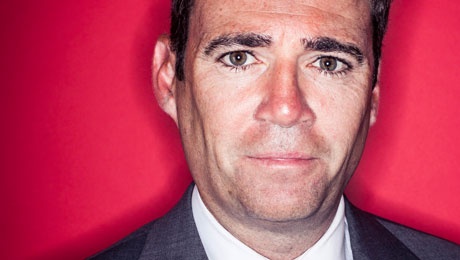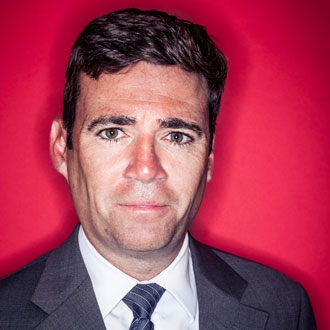
Sitting in the shadow health secretary’s office, you are reminded that they are preparing for power. It is a hive of activity as special advisers and secretaries go about their daily work around us – pushing out FOI requests, discussing research and writing speeches.
Pulse meets Andy Burnham at a time when Labour is gearing up to kick-start its preparation for the general election. It’s only a few weeks until the party conference where the party will announce a £2.5bn funding boost for the NHS and plans for 8,000 more GPs.
But it will be Mr Burnham’s plans to ask all hospitals to become integrated care organisations that will prove the most controversial amongst GPs. His plans to ditch payment by results and pay hospitals to deliver whole pathways of care in the community, and employ salaried GPs to do this, prompt the RCGP to warn he risks destroying ‘everything that is great’ about general practice.
Mr Burnham gives Pulse a preview of his plans and outlines the ‘very big choice’ the electorate will have next May as to ‘what sort of NHS’ the country will have in the future.
He has a way to go before he convinces GPs. The profession is likely to welcome his plans to repeal the competition regulations from the Health and Social Care Bill, but his plans for yet another vast reorganisation of NHS structures and the proposed reintroduction of the 48-hour GP appointment target have not gone down well with the profession.
He will need GPs onside if he manages to become health secretary for the second time. But with just seven months to go, he is running out of time.
Why reintroduce the 48-hour target when it was so distorting last time?
The policy was more nuanced than I think came across. It was a graduated offer: either a same-day consultation that didn’t have to be with a GP but could be a health professional; 48 hours if it was needed or wanted; or the ability to book ahead with a named GP. That, we know, gives a lot of reassurance to older people. If you look at the way the health service will have to go, it has to be as preventive as possible and we have to work to offer patients the best possible access at the first point of contact because that is the only way things will be financially sustainable in the long run. So I would take it as an encouraging sign that we will be determined, as a Government, to swing the pendulum from hospital-based care to the community and into primary care.
Could GPs have more pay?
They could, but we are in a different world and no-one is going to thank me. The big thing is painting a picture of what this profession might be. Whole-person care is about rethinking generalism, what is good generalist care in the 21st century and how health professionals might work differently to provide it. I can very much envisage a future where we have more integrated care organisations that employ GPs [who] sit at the centre of teams that are multidisciplinary and [are] the decision maker in this new model. It is not just about the money.
What about promising sustainable levels of funding?
I want sustainable models of care at the local level. That is about unlocking money tied up in hospital as I can’t see any other way of making this system sustainable going forward. We need to be open to the idea that that might mean a GP working as a salaried employee of an integrated care organisation. I want to see district general hospitals grow into integrated providers, working from home to hospital. It is not going to be right for everybody, but it could be for some people.
Will you support Pulse’s Stop Practice Closures campaign?
Definitely, I am happy to. How can it make sense to close any practice, or let any practice close, when the pressure on GPs, on getting appointments, is getting to unsustainable levels? This is particularly the case when some of the practices at risk of closure might be in areas that most need good access to primary care. I think your campaign has had some success – there was a partial backtrack from NHS England over the summer.
Will you halt the withdrawal of the Minimum Practice Income Guarantee?
Yes. It’s not for me to start writing the detail of spending policies right now and I will have to look exactly at what I inherit, but I will halt the situation in which any practice is on the brink of closure. If MPIG can be phased out eventually it has to be done over a long period of time, so that no practice will have its viability threatened.
And what about the PMS reviews?
Like anything, you can review it and say ‘well this was done in 2007 or 2008 and there were different assumptions at that point about funding, and maybe that can be trimmed’. But just to kind of chop it back down – I think that could cause significant damage to the availability of general practice.
What do you make of your opponent’s running of the NHS?
I feel Jeremy Hunt is running a PR operation and there is no serious attempt at accountability. The question to be asked post-reorganisation is ‘who runs the NHS?’
Does Labour want local authorities to commission more NHS care?
I do think [NHS commissioning] needs to be a partnership between health and local government because 21st-century care can’t just be a medical model of commissioning. It has to be a broader view of society and the determinants of health. Housing, education and other things have to be brought into the picture, and that is why I think making the health and wellbeing board the pre-eminent body makes sense.
Would NHS England still run the health service on behalf of the Department of Health under Labour?
I said when the Conservatives first floated this idea that it would be the biggest quango in the world, with a multibillion-pound budget, and I think if you spoke to many MPs that’s how they feel. They now write to ministers about major issues, cancer services in their region, and are told ‘we don’t know; speak to NHS England’. But it hasn’t worked. You’ve got Jeremy Hunt and ministers interfering in minutiae and thinking they still run it and when it suits them they will say ‘oh no, it’s them’. The Government hasn’t decided whether it wants an independent body running the NHS. It is very confusing. The health secretary should make it clear whether he or NHS England is in charge.
You don’t think much of NHS England’s track record then?
For a reform that began as being about GPs, it seems the general practice profession is now suffering from the lowest morale in a very, very long time. A reform that was all about empowering general practice has worked its way through and left us with general practice on the floor, in bits, with practices closing. What an indictment of what the Government has put the NHS through over the past five years. I think it is criminal. They have really degraded the whole system and the people within it, who are at a pretty low ebb. What I’m trying to do is offer the people who care about the NHS hope that it can be put back together and can be the service we all want it to be.
So will all that change in May?
Well, it’s back to the secretary of state. NHS England as an entity could have a future as a regional structure that helps co-ordinate care, helps hold providers to account, organises specialised commissioning, helps deal with that bigger picture, and some of the functionality that was lost when SHAs were wound down.
What do you see as the long-term role of GP’s in commissioning?
I think GP involvement in commissioning is a good thing. I have always thought that. But I also think that GP domination or control of commissioning is not a good thing, for the public interest but also for the profession. I think the Act has saddled the GP profession with a millstone that could become very damaging to public trust.
Some GPs might question why you are focusing on rearranging structures again instead of improving care?
I am not going to change the organisations I inherit, but that doesn’t mean I won’t give them a new job to do. That new job is whole-person care, fully integrated health and social care.
CV
Age: 44
Family: Married to Marie-France, with a son and two daughters
Education: Read English at University of Cambridge
Career:
2008-09 Secretary of State for Culture
2009-10 Secretary of State for Health
2010-11 Shadow Secretary of State for Education
Since 2011 Shadow Secretary of State for Health
Career high: My work with the Hillsborough families will be the most fulfilling thing I will ever do in my life
Personal interests: Everton Football Club, indie music and running.

















